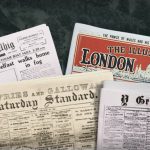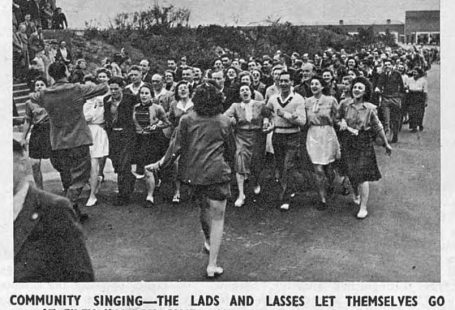As part of Black History Month this October, we have taken a look at the extraordinary life of Learie Constantine (1901-1971), a cricketer from Trinidad who would go on to become the United Kingdom’s first ever Black peer.
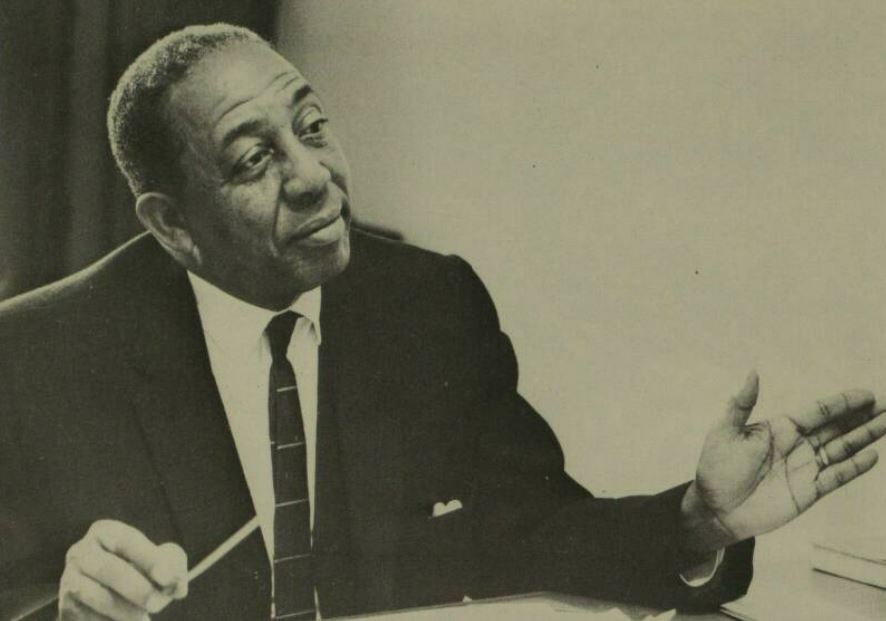
The first player to take a Test match wicket for the West Indies, and described as one of the best all-round cricketers the world has ever seen, Learie Constantine’s career extended beyond sport, as he fought tirelessly against racial discrimination, as he became a writer, broadcaster, and even a barrister.
And so, in this very special blog, we will take a look at the inspiring life of Learie Constantine, and how he was reported upon in our newspapers, from the 1920s all the way through to the 1960s.
Register with us today and see what stories you can discover
‘Trinidad Idol’
Born in Petit Valley in north-west Trinidad on 21 September 1901, the second child of cricketer Lebrun Constantine, Learie Constantine toured England with the West Indies cricket team in 1923. But it was not until the late 1920s that we find mention of Constantine in our newspapers, and the mentions of him are in the most glowing of terms.
An interview in the Athletic News on 25 June 1928 by Kay dubbed the young all-round cricketer as the ‘Trinidad Idol.’ This interview provided an effective introduction of Learie Constantine to a British audience, as the man himself discussed his early life, and explained how he got his name:
Every one of my friends call me Learie. How I came by that name makes an interesting little story. In 1900, my father was on tour with the West Indies side in England and he made quite a number of friends. Among them was a delightful fellow named Learie, an Irishman. Another was named Vivian. Father liked these friends so much that he decided my Christian names should be Learie Vivian, but mother had different views. She argued that Vivian was a girl’s name, but allowed the other to stand!
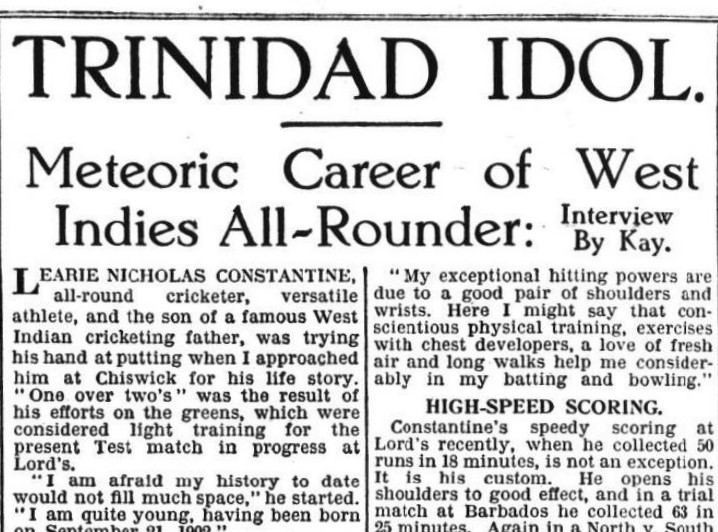
The piece in the Athletic News describes Constantine’s early life; how he played cricket for his school in Trinidad, how he became captain of the school’s first team in 1915, and how he played in his first second-class match by 1919. A score of fifty not out then propelled him into first division cricket.
Kay gives a wonderful snapshot of Constantine’s batting style and prowess, relating how:
Constantine’s speedy scoring at Lord’s recently, when he collected 50 runs in 18 minutes, is not an exception. It is his custom. He opens his shoulders to good effect, and in a trial match at Barbados he collected 63 in 25 minutes. Again in a North v. South match at Trinidad last year he knocked up 68 in 23 minutes, but, in his opinion, his best was 130 scored against Queen’s Park in 73 minutes.
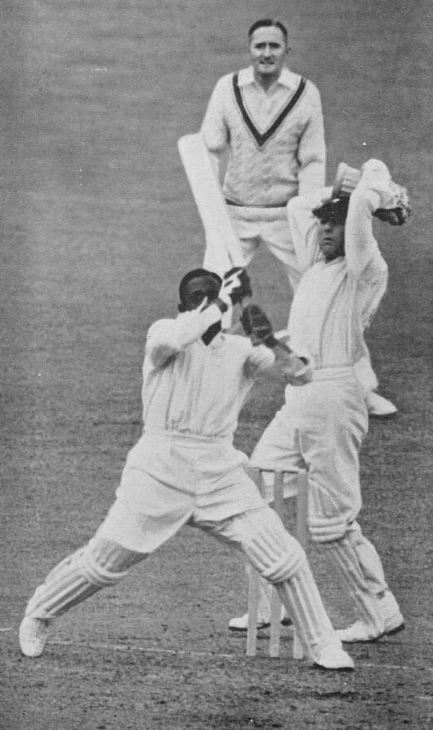
And of course, Learie Constantine was not just a batsmen, he was a recognised fast bowler, too. Talking to Kay, he recalled his ‘best bowling performance,’ which was against Barbados in 1924. The Barbados team were 150 for one when Constantine stepped up to bowl. At the end of his spell, Constantine had taken eight for 38.
‘Nelson’s New Professional’
And by the next year, 1929, Learie Constantine was set to make England his home, beginning a relationship with the country that would last for decades.
On 12 April 1929 Lancashire newspaper the Nelson Leader reported how Nelson Cricket Club had engaged a new professional, a ‘versatile’ player whom the newspaper proclaimed to be ‘one of the finest cricketers in the world.’
Nelson’s new professional was none other than Learie Constantine, and his new local newspaper gave him a stirring introduction:
Constantine was a member of the West Indies team that visited England last season, and his wonderful fielding, fast bowling and hurricane hitting won him great fame very quickly. In a mediocre team he stood out as a giant, and it was soon apparent that Constantine was a cricketer with a touch of genius about him. He was a tremendous attraction on the grounds he visited, and so insistent were county officials in Constantine appearing on their grounds he got little rest.
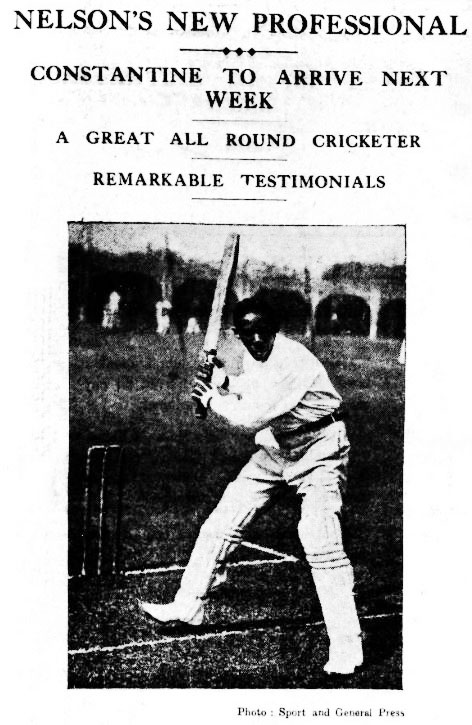
Praise for Learie Constantine’s talent again filled the pages of the Nelson Leader, this time in June 1929. Scottish cricketer Alexander Fraser, from Inverness, had travelled to Jamaica the preceding summer, where he had the chance to see Learie Constantine in action. He wrote how Constantine stood ‘out from all the rest,’ describing him as the ‘hardest hitter I have ever seen.’
Fraser finished his analysis of Constantine with this proclamation:
I have been playing cricket from the time of good old Adam, but I have never seen anything to equal Mr. Constantine. He has made his name in history in the four corners of the globe, and will continue to do so; and not only will he continue to make history, but to tire history with his name.
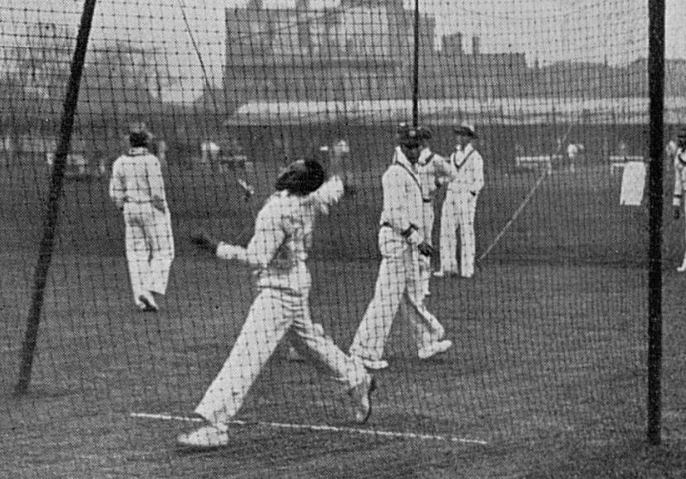
Meanwhile, newspapers in the Caribbean traced Constantine’s progress in Britain. On 27 September 1930 the Dominica Tribune published Learie Constantine’s ‘opinion of Don Bradman,’ the legendary Australian cricketer. Constantine expressed his wish to bowl at Bradman, for the ‘experience and education’ it would offer, explaining how English batsmen Jack Hobbs was ‘the best of all those I have bowled against.’
In the same piece, Constantine described his achievements for Nelson Cricket Club:
So far my best score is 124 in an hour for Nelson. I made 106 in 55 minutes the other day. Nelson won the championship last year and are hoping to do it again…If the West Indies should need me for Test matches, my contract with Nelson will allow me to play.
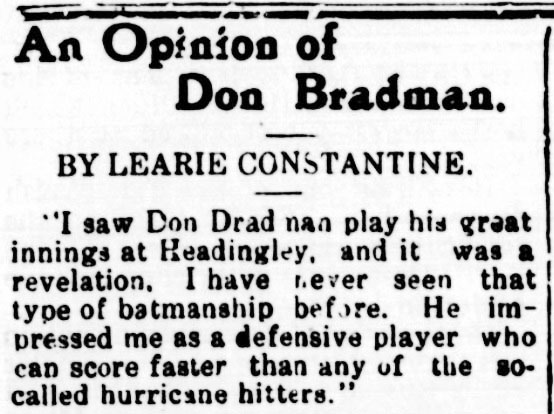
Constantine would play eighteen Tests in his career for the West Indies, whilst also playing for Nelson C.C. and for Trinidad and Tobago. The Dundee Courier in January 1935 describes one such innings for Trinidad, where Learie played alongside his brother Elias for the first and only time in a first class cricket match. The brothers saved the Trinidad and Tobago team ‘from collapse,’ putting together a ‘breezy partnership.’ In his typical style, Learie Constantine treated the ‘bowling with scant respect,’ scoring 68 runs in a partnership of 93 for the seventh wicket.
Welfare Work In The Second World War
But the outbreak of the Second World War in 1939 would change the trajectory of Learie Constantine’s career, providing him with an opportunity to fight for racial equality, a cause that was extremely close to his heart.
The Burnley Express in January 1946 recalls how Constantine worked ‘as a billeting officer at Nelson in the early part of the war.’ And then in 1941, Constantine ‘received a Government appointment as welfare officer under the Ministry of Labour to look after a large number of West African workers in the Liverpool area.’
Through this social work, the Burnley Express writes, Constantine became ‘very popular…in Merseyside.’ In his book, Colour Bar, which was published in 1954, Constantine looked back at this time.
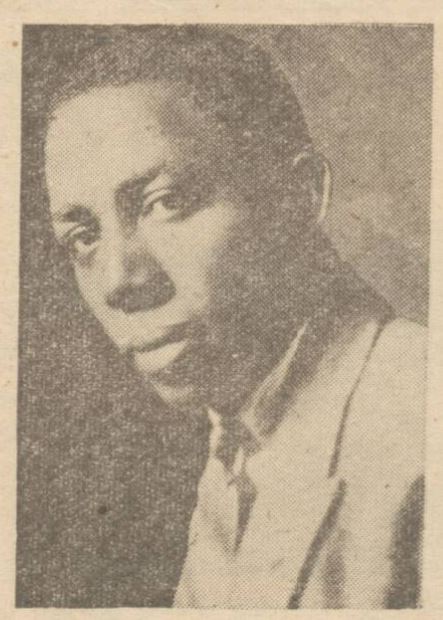
As the Liverpool Echo describes in August 1954, Constantine ‘was asked to solve a difficulty at a great powder factory in the North-West, which then employed some 30,000 people.’ The workers at the factory, which included Black employees, were put up at various hostels. Some of the workers ‘objected’ to the Black workers being so housed, and this was the problem that Constantine was asked to solve.
Constantine recalled the steps he took to promote understanding between the workers:
I took a private room in one of the hostels and went to live there for a time myself. I hoped that the white workers could see that I was an ordinary sort of person like themselves and then they might be willing to try some other coloured people as acquaintances. Actually the ruse proved quite successful.
He went on to remember a painful moment of racism, when he was accosted in a dance hall of one of the hostels by ‘a man in an American Air Force officers’ uniform.’ The American officer, who had ‘aggressively shouldered the whole length of the hall’ towards Constantine, yelled at him to ‘get out,’ shouting that ‘where we are’ they did not allow Black people to mix with white. However, it was ‘the aggressor who had to get out.’
‘Learie Constantine Is Awarded Five Guineas’
That was not the only incident of racial discrimination that Learie Constantine faced during the Second World War, or indeed, throughout his stay in the United Kingdom.
In June 1944 the Manchester Evening News reported how Constantine was awarded £5 5s damages at the High Court in London, following his claim against the Imperial Hotel in Russell Square. Constantine claimed that the hotel had ‘refused to receive and lodge him,’ and the judge ultimately sided with his claim.
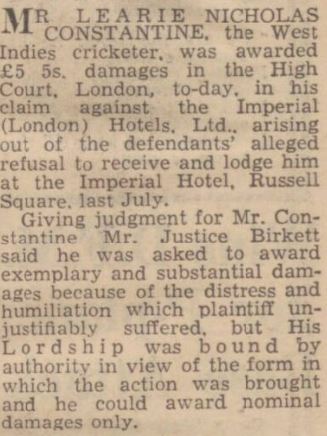
The article relates how:
Giving judgement for Mr. Constantine Mr. Justice Birkett said he was asked to award exemplary and substantial damages because of the distress and humiliation which plaintiff unjustifiably suffered, but His Lordship was bound by authority in view of the form in which the action was brought and he could only award nominal damages only.
It was revealed the hotel’s manageress Miss O’Sullivan had used ‘contemptuous and insulting words’ towards Constantine when he had attempted to check into the hotel. Indeed, she was described as being ‘grossly insulting.’
And although the judge decreed that the hotel ‘refused to receive and lodge [Constantine] without any just cause or excuse,’ the only result was that Constantine received his five guineas. However, the coverage of the racism faced by Constantine, who was then a prominent public figure in Britain, would have shone a light on the racial discrimination that was very much endemic within the country at the time.
New Year Honours
By the 1940s, Learie Constantine was very much part of the fabric of British life. In December 1945 the Nelson Leader reported how the ‘famous West Indian cricketer and former Nelson professional’ was due to participate in the radio programme ‘Children’s Hour.’ During this broadcast, he was set to tell ‘his young listeners about Trinidad.’
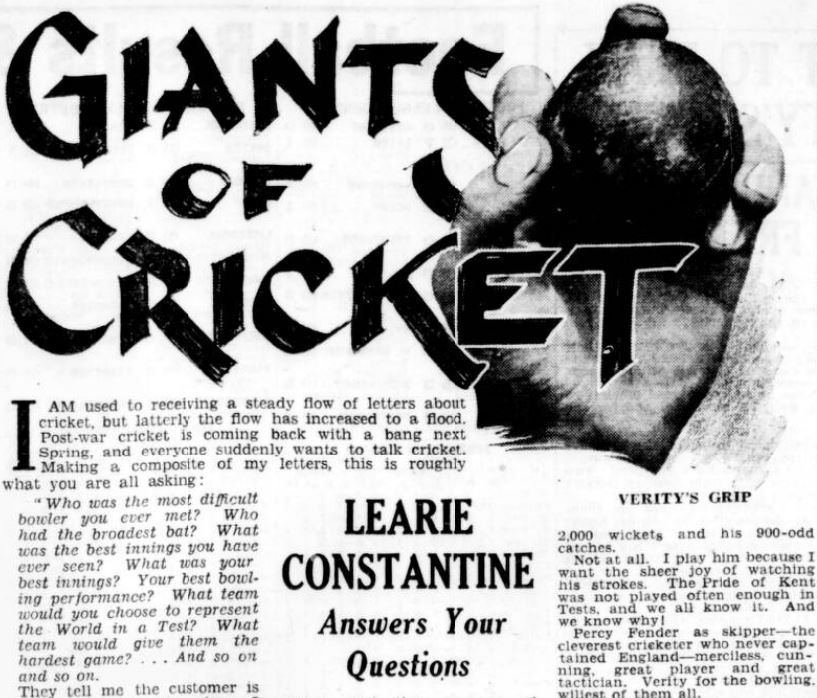
This followed another broadcast, in which Constantine ‘presented his own choice of records in the North of England home service.’
And in the next month, January 1946, it was announced that Constantine had been awarded the M.B.E. for his ‘welfare work’ during the Second World War, in the New Years Honours list.
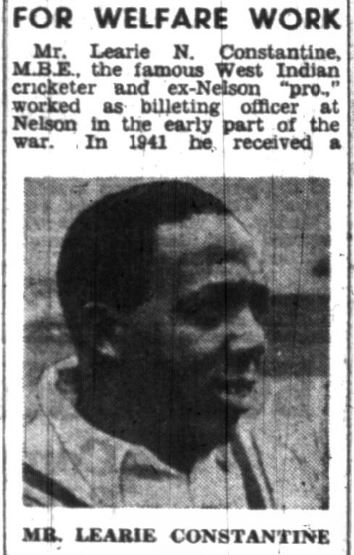
In the years following his award, the British press continued to trace Learie Constantine’s career. In January 1947, the Dundee Evening Telegraph announced how he had ‘been appointed coach to Leinster and Dublin University clubs for next season,’ whilst in September 1948 the Shipley Times and Express pictured Constantine after his ‘final’ competitive cricket match.
The caption to the photograph read:
Learie Constantine, who ended his illustrious career in competitive cricket in typically swashbuckling fashion, framed in a gallery of his Windhill colleagues, whom he captained to a thrilling Bradford Cricket League championship success on Saturday.
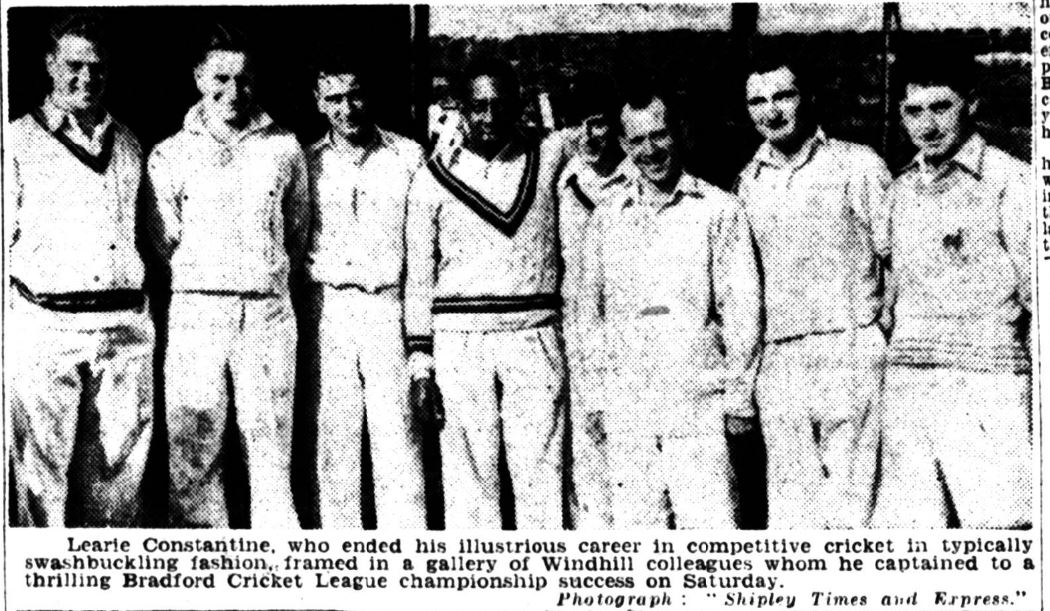
But Constantine continued to play cricket into the 1950s. The Banbury Advertiser on 4 August 1954 described the man himself in action for a West Indian side, against Banbury. Constantine was the ‘chief’ draw in the match, with the newspaper noting how he had ‘done a great deal both on and off the field for his fellow countrymen.’
Furthermore, the Banbury Advertiser described how that at the age of 53, Constantine was ‘still a very fine cricketer,’ and off the pitch, talking to ‘the little bands of cricketing enthusiasts, his engaging personality, warm humour and friendliness won the admiration of all who talked with him.’ The author ended his article by stating how it was a ‘real pleasure’ to meet Constantine.
‘Learie Constantine Hits Out At The Colour Bar’
As well as continuing to perform feats on the cricket pitch, Constantine was agitating to affect real change in the sphere of race relations. In 1947 he had become Chairman of the League of Coloured Peoples, a position he held until 1951 when the League was discontinued. In 1954, he published a book entitled Colour Bar, which was reviewed by Arnold Edmondson for the Liverpool Echo in August 1954.
The book, which Edmondson dubbed as ‘outspoken,’ contained these powerful lines:
I am black. My grandfather and grandmother were the children of slaves born into slavery. I am neither proud nor ashamed of these things…Black or white – it appears to be what we call an accident of birth. But it is a fact, and one which has inevitable economic, social and political results.
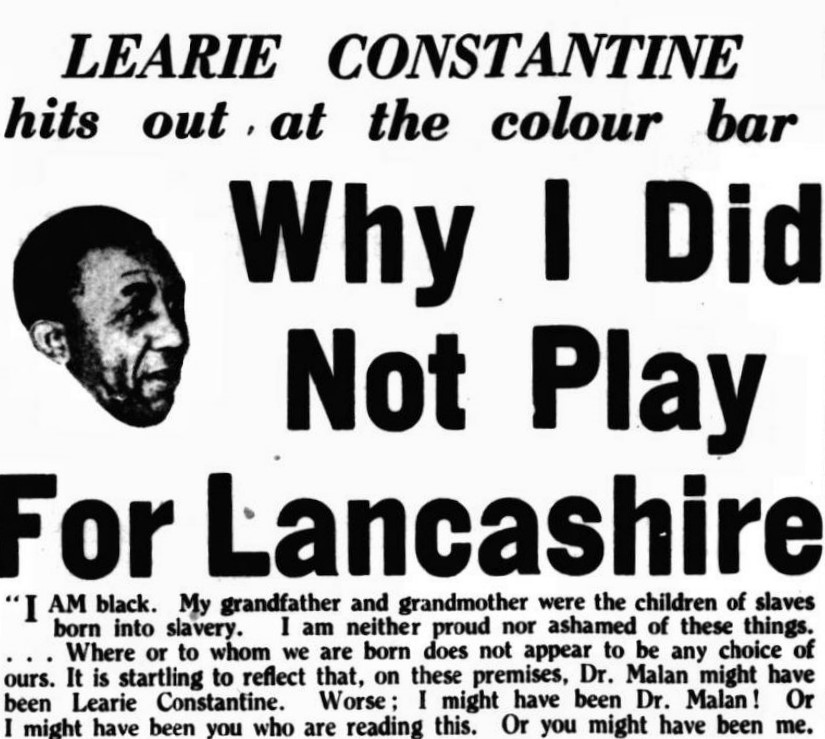
In Colour Bar, Constantine opened up about the racial discrimination he faced in the United Kingdom and elsewhere. This included him being prevented from playing for Lancashire County Cricket Club. As Constantine revealed, there was some ‘unpleasant disagreement because of [his] colour.’
Constantine would open up about this shocking display of discrimination again in November 1954, when writing for the Daily Mirror. He described how:
There was the time I was approached to see if I would play for Lancashire. I would have given almost anything I had to play for Lancashire, and said so. I believe the customers wanted me, as did most members of the committee. But trouble arose about my colour…it is hard, even now, not to be bitter about that.
Constantine’s pain is evident here, and sadly, this incident was not the only time he faced discrimination because of the colour of his skin.
In Colour Bar, he related an occasion when his wife and daughter had booked on a sleeper train, to take them from London to Edinburgh, to attend his daughter Gloria’s graduation at St. Andrew’s University. When they entered the sleeper train to deposit their things, a white woman called out ‘Steward, what does these mean?,’ protesting that she would not sleep alongside Black people. To add further insult to this appalling display, Constantine related how:
Another figure appeared behind the protestor, a white girl whom my daughter knew quite well, and she added her complaint in similar terms, though previously she had never offered the slightest objection. This scene so upset my wife and daughter that they refused to travel down in a sleeping compartment.
In this book, Learie Constantine gave an important voice to Britain’s growing Black population. He called out difficult truths, which were then reported in the pages of our newspapers. With his position as a famous sportsman, broadcaster, and now writer, he became something of a spokesperson for Britain’s Black community, a position that he would embrace.
‘A New Career’
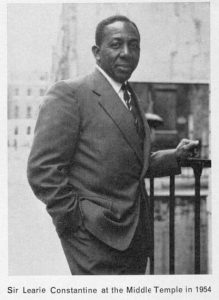
And whilst Learie Constantine had been busy, writing books, broadcasting, and coaching, all the while he had been studying law. On 30 October 1954 the Edinburgh Evening News announced how Constantine was set to ‘take up a new career,’ as he had the day before learned that he ‘had qualified as a barrister.’
Change was afoot for Constantine, as he announced his intention to return to Trinidad and to ‘specialise in criminal law.’ And in November 1954, he penned a farewell article in the Daily Mirror, admitting how in saying farewell to England his heart was breaking. But he explained in the same article why he was returning, writing how:
I love Trinidad, with its heart-warming sunshine, its eager people who are my people, and (as I believe) its happy future. I am going home because I want to take some part, however little, in shaping that future.
Constantine, however, noted his growth in the country that he had called home for some twenty-five years, describing how he had arrived in Britain as an ‘inexperienced boy,’ and how he was leaving as ‘a qualified barrister-at-law,’ armed with ability to use his ‘legal knowledge for the benefit of [his] own people and for the improvement of relationships between white and black.
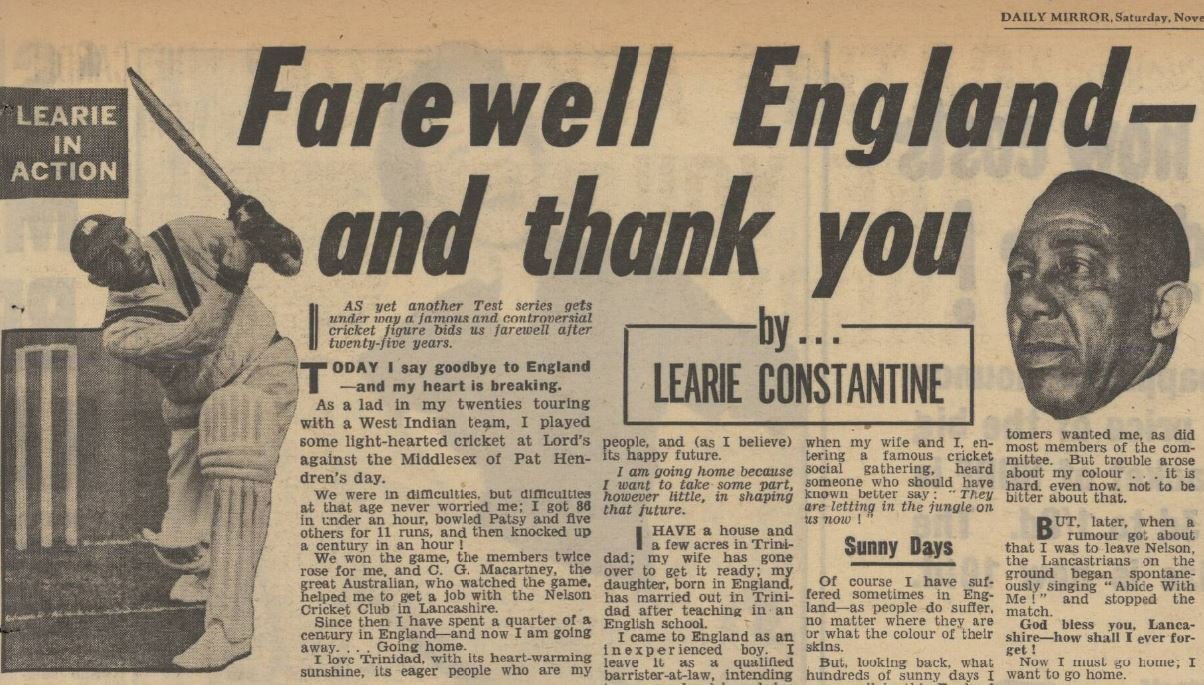
In this article for the Daily Mirror Constantine really encapsulated the duality of the experiences he had faced in Britain: from the warmth of the reception he received, to the appalling discrimination he faced. He writes how:
It hasn’t always been easy. There were times when life seemed to hold champagne to my lips – as thousands of generous English spectators applauded a century I had hit, or some bowling or fielding feat I had done. There was also a time when – at the wicket – somebody near by spoke of my colour in terms which would have cost him dear in a more private place.
He also looked back fondly at his time in Lancashire, recalling how:
…when a rumour got about that I was to leave Nelson, the Lancastrians on the ground began spontaneously singing ‘Abide With Me!’ and stopped the match. God bless you Lancashire – how shall I ever forget! Now I must go home; I want to go home.
It is a truly emotive piece, a testament to the extraordinary man himself.
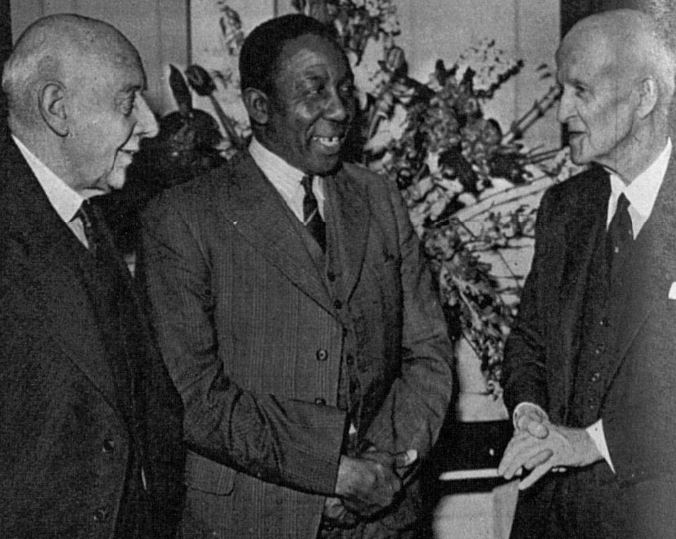
And on his return to Trinidad, Constantine would achieve a different sort of success. On 25 September 1956 the Halifax Evening Courier described Constantine as a ‘hero’ of his ‘party’s victory,’ as he won a seat in Trinidad’s Legislative Assembly. He was representing the People’s National Movement, an eight-month-old party that had ‘aroused great interest throughout the colony because of its clear-cut programme of self-government for Trinidad and Dominion status for a British Caribbean Federation in five years’ time.’
Trinidad High Commissioner
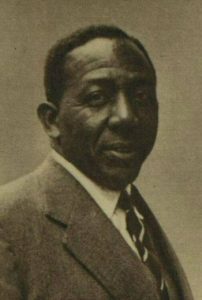
But by 1961, Constantine was back in Britain, following his appointment as Trinidad High Commissioner in Britain, the first person to hold this position. Following this announcement, he was pictured by the Illustrated London News, in October 1961.
And in 1962, Learie Constantine was knighted, and he also received the freedom of the town of Nelson, where had played cricket all those years ago.
By 1963, the Illustrated London News reported that Constantine had ‘resigned as Trinidad High Commissioner in London.’ His resignation had followed his intentions to speak out on racial issues affecting West Indian immigrants, and his involvement in the Bristol bus boycott. The Bristol bus boycott saw a bus company in the city refusing to employ Black workers, and Constantine reacted by visiting Bristol and speaking out on the matter. However, it was felt, both in Trinidad and Britain, that a senior diplomat should not be involving himself so closely in British domestic affairs.
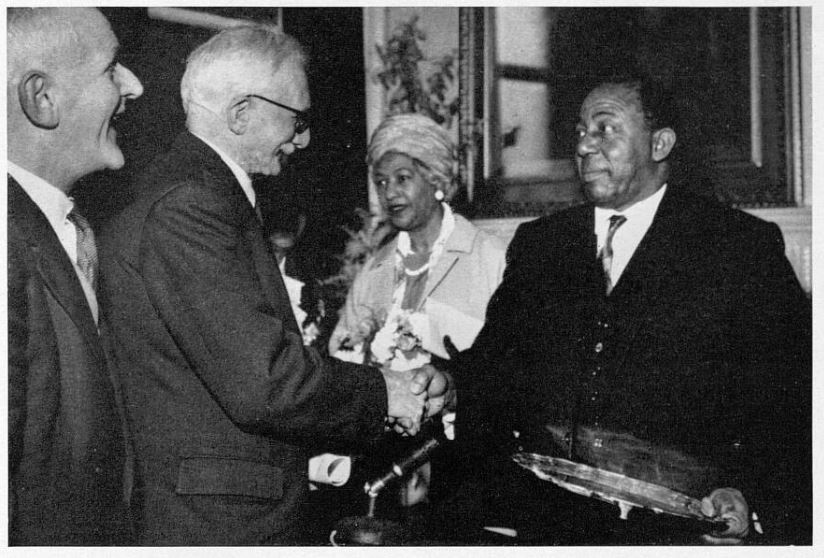
As the Illustrated London News noted in October 1963, Constantine was a ‘prominent champion of racial equality.’ He resigned his high position, sticking to his firmly held values. And instead of returning to Trinidad, he stated his intention to remain in the United Kingdom.
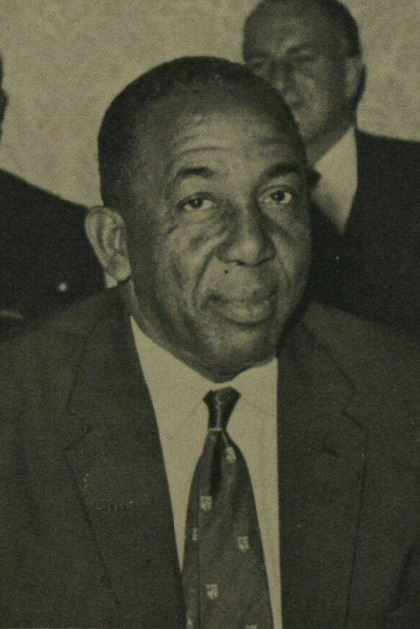
But Constantine was still in the position of Trinidad High Commissioner in January 1964 when he was profiled for The Sphere by Charles Dimont. He provided to Dimont little insights into his life and personality, professing that he should have liked to have been a musician, although he couldn’t ‘play a note,’ and also his discussing cricketing career, maintaining that Jack Hobbs was the greatest cricketer out of his contemporaries, dismissing Sir Donald Bradman for his lack of musicality.
Dimont goes over, furthermore, Constantine’s work as a barrister, diplomatist, journalist, author, and broadcaster, writing how:
Yet when all this is said and done, I believe it takes second place to the abiding passion of his life. This is his burning desire to work for coloured people in Britain or anywhere else. If you ask him how British attitudes towards coloured people in Britain compare with when he first came to the country in 1923, he says there’s no comparison at all. What he does not add, and never would, is that considerable share of the credit for this improvement belongs to himself.
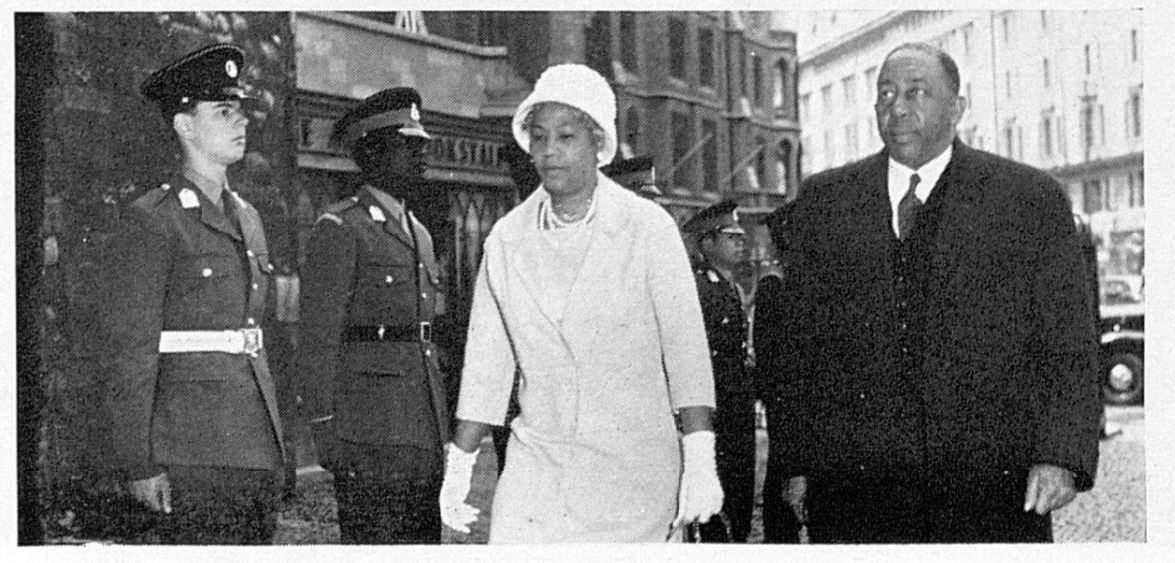
And Dimont finally concludes how Constantine:
…is a man of diffuse interests but when one comes to sum him up, one realises that whatever his activities, they reflect his real interest, which is not a single sphere of cricket or music, or the law or diplomacy, but, in one word, humanity.
‘Lord Learie’
And Learie Constantine was to be recognised for his hard work for racial equality and his other outstanding achievements in the New Years Honours List of 1969. The Newcastle Evening Chronicle announced how he was to be made ‘Lord Learie,’ as Constantine made history by becoming Britain’s first Black peer.
He would taken on the title of Baron Constantine of Maraval in Trinidad and of Nelson in Lancashire. He thus became the first Black peer to sit in the House of Lords.
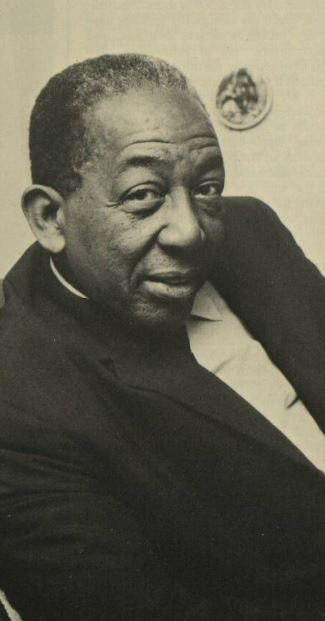
However, when Constantine received his peerage he was ‘ill in bed,’ as the Newcastle Evening Chronicle reported. Although, the new peer was able to give a statement:
I think I must have been awarded the peerage for what I have endeavoured to do to make it possible for people of different colours to know each other better and live well together.
It was proper recognition for all that he had achieved in his remarkable lifetime, a pivotal time of change, as he worked to undo centuries’ worth of prejudice, on the cricket field, in print, and through his actions.
Lord Learie Nicholas Constantine passed away on 1 July 1971 in London. His body was returned to Trinidad, however, where he was given a state funeral. You can find out more about the remarkable life and career of Learie Constantine in our newspapers here, and discover more remarkable Black figures from history here.


